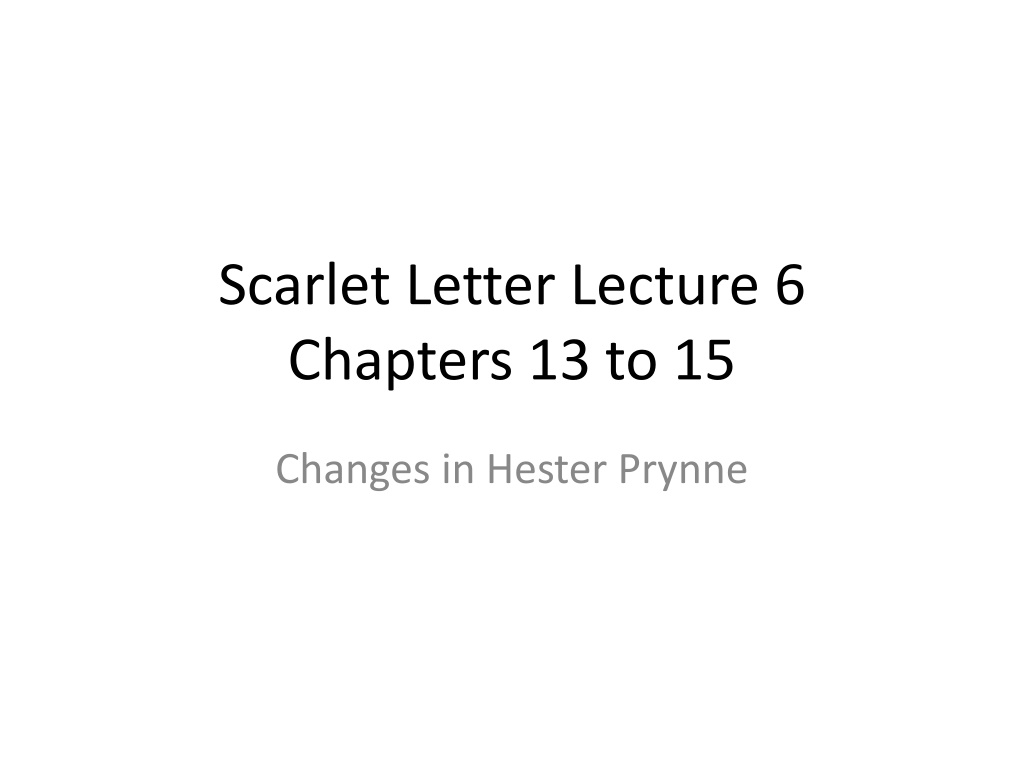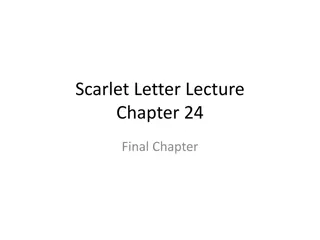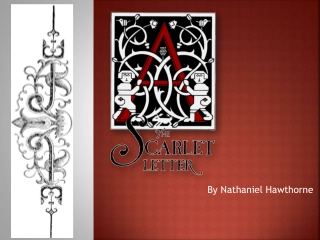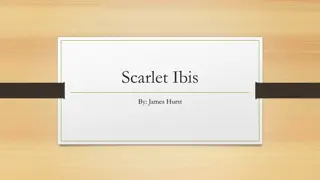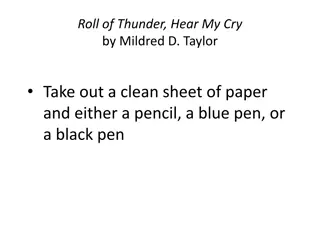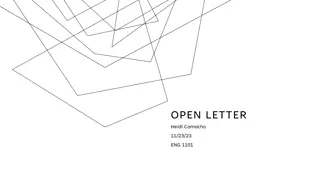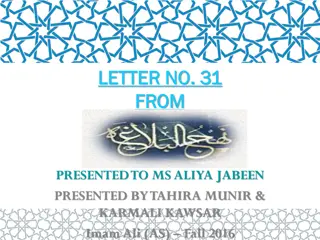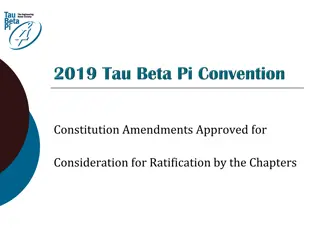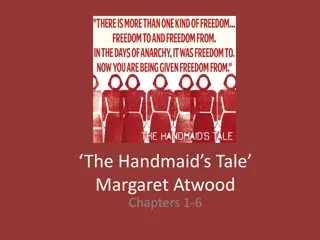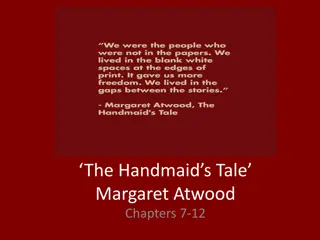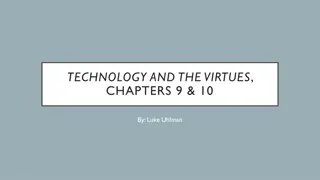Changes in Hester Prynne: Scarlet Letter Lecture 6 Chapters 13 to 15
The lecture explores the evolution of Hester Prynne in chapters 13 to 15 of "The Scarlet Letter". It also delves into Diogenes' philosophy of living outside society and discusses the use of language and dialogue in historical novels to depict Puritan society. Examples from the text illustrate the characters' interactions and thematic depth.
Download Presentation

Please find below an Image/Link to download the presentation.
The content on the website is provided AS IS for your information and personal use only. It may not be sold, licensed, or shared on other websites without obtaining consent from the author. Download presentation by click this link. If you encounter any issues during the download, it is possible that the publisher has removed the file from their server.
E N D
Presentation Transcript
Scarlet Letter Lecture 6 Chapters 13 to 15 Changes in Hester Prynne
Diogenes (412-323 BCE) The Individual and Society Diogenes of Sinope - an ancient Greek Philosopher - advocated dropping out of society and living an individual self-contained life as close to nature as possible. In line with these principles Diogenes ate and slept wherever he chose; went about naked, and scorned all other social conventions; This was his way of criticizing the social values and institutions of his time which he saw as corrupt; One of his colourful eccentricities he was always carrying a lamp reason(?) reportedly as an aid in his search for an honest man.
[Aside Note] Language and Dialogue Period and Place The remoteness of the time and the strangeness of the Puritans concerns and conditions requires that - stateliness of dialogue; The characters in speech may imaginably say methinks and peradventure , and other words expressing things dear to them - pertinent to a historical, romance-based novel; The NARRATOR himself - uses antiquated or unwonted diction and phrases in which he finds colour, and deliberately avoids the brevity and informalities of actual everyday mundane speech;
For example - from Chapter 14 p151 Chillingworth speaking to Hester: Thou hadst great elements. Peradventure, hadst thou met earlier with a better love than mine, this evil had not been. I pity thee, for the good that has been wasted in thy nature! Hester in reply to Chillingworth: And I thee, answered Hester Prynne, for the hatred that has transformed a wise and just man to a fiend. Wilt thou yet purge it out of thee, and be once more human?
Example from Chapter 8 p101 Dimmesdale on Hester and Pearl Reverend Dimmesdale to Governor Bellingham and John Wilson about - Hester Prynne and Pearl: She recognizes, believe me, the solemn miracle which God hath wrought, in the existence of that child. And may she feel, too, what, methinks, is the very truth, that this boon was meant, above all else, to keep the mother s soul alive, and to preserve her from blacker depths of sin into which Satan might else have sought to plunge her!
Language and Dialogue (cont) By deliberately avoiding short-cuts and informalities, the Narrator heightens by these methods - the intended effects he is seeking - Through the veil of the quaint parlance, and under the 17thcentury verbal costuming - Effect: We come to see the same human heart beating in 17thcentury Boston New England, as well as in the Narrator s own time (from the Custom-House), and all times And the same antagonistic motives working - which have always governed human conduct.
Recalling Chapter 12 The Second Scaffold Scene A pivotal chapter Dimmesdale mounts the scaffold in the market-place at night; He held the appearance of a gleaming, accusatory immense letter A marked out in lines of dull red light ( doubtless caused by one of those meteors ) Symbolizes his unsettled, troubled state of mind
Focus of this Lecture: Presentation of Changes in Hester Prynne Chapter 13: Another View of Hester Offering new perspectives on Hester s personality Chapter 14: Hester and the Physician Chapter 15: Hester and Pearl And Hester s Revolutionary Struggle The lover as social rebel
Commentary overview of Plot Progression thus far Through the first 12 Chapters - the narrator s sympathies remain with Hester; Narrator s attitude to Hester changes in Chapter 13; The presentation of Pearl s aggressive, belligerent behaviour in the early chapters foreshadows what Hester becomes a revolutionary, and reveals the confrontational streak possessed by her mother - Above all, the warfare of Hester s spirit, at this epoch, was perpetuated in Pearl [Chapter 6 p82] This is symbolically suggested through Pearl s action of throwing stones at the Puritan children the most intolerant brood that ever lived Chapter 6 p80
Symbolical Significance of Pearl s Actions Pearl smote down and uprooted the ugliest weeds that symbolically represent the Puritan children; [Chapter 6] and Pearl s splashing the Governor - with water - as reported by Chillingworth in Chapter 10 p117 [Pearl] She never created a friend, but seemed always to be sowing broadcast the dragon s teeth, whence sprung a harvest of armed enemies, against whom she rushed to battle Chapter 5 p85 Hester s own martial spirit comes to the fore in her confrontation with Governor Bellingham in Chapter 8;
Change in Reputation Seven years - have passed - since the birth of Pearl Hester has been accepted by the Puritan community and has outwardly accepted the role she has been forced to assume; Her acts of charity, and acts of kindness have earned her respect And now most ordinary townspeople interpret the letter - A - upon her bosom as symbolically standing for being Able But from within her character, her inmost Me - it is different matter
The human intellect, newly emancipated; She assumed a freedom of speculation Hester s transformation in the middle of the novel? Appears to be from that of a - Sinner to that of a - Saint; For despite these changes in the Puritan s attitude, Hester s attitude to herself had not; Chapter 13 shows Hester is now only really at home in darkened spaces; during the daytime she keeps to herself; does not show similar compassion to herself; In reality - Hester has now become a radical revolutionary and is hyperbolically likened by the narrator to philosophical dissenters - advocating freedom of thought - during this period in Europe [Chapter 13, p143] In revolt against the established norms of the Puritan political-religious order of Boston New England
Change in Hester Prynne Chapter 13 p139-140 Hester Prynne did not now occupy precisely the same position in which we beheld her during the early periods of her ignominy. Years had come, and gone. As is apt to be the case when a person stands out in any prominence before the community, and at the same time, interferes neither with public nor individual interests and convenience, a species of general regard had ultimately grown up in reference to Hester Prynne. Note: Suspended Syntax - subordinate clause opening and created cumulative rhetorical effect
Chapter 13 p140 Note Narrator s Reflective Commentary [It is to the credit of human nature, that, except where its selfishness is brought into play, it loves more readily than it hates. Hatred, by a gradual and quiet process, will even be transformed to love, unless the change be impeded by a continually new irritation of the original feeling of hostility.] In this matter of Hester Prynne, there was neither irritation nor irksomeness. She never battled with the public, but submitted uncomplainingly to its worst usage; she made no claim upon it, in requital for what she suffered; she did not weigh upon its sympathies. Then also the blameless purity of her life, during all these years in which she had been set apart by infamy, was reckoned largely in her favour.
A for Ability; Altruism; Chapter 13 p141 She was a self-ordained Sister of Mercy; or, we may rather say, the world s heavy hand had so ordained her, when neither the world nor she looked forward to the result. The letter was the symbol of her calling. Such helpfulness was found in her, so much power to do, and power to sympathize, that many people refused to interpret the scarlet letter A by its original signification. They said that it meant Able; so strong was Hester Prynne, with a woman s strength.
Chapter 13 p141 More Favour than she Deserved The public is despotic in its temper; it is capable of denying justice, when too strenuously demanded as a right; but quite as frequently it awards more than justice, when appeal is made, as despots love to have it made, entirely to its generosity. Interpreting Hester Prynne s deportment as an appeal of this nature, society was inclined to show its former victim a more benign countenance than she cared to be favored with, or, perchance, than she deserved.
The Rulers, and the Wise Men of the Boston Community p141 The rulers, and the wise men of the community, were longer in acknowledging the influence of Hester s good qualities than the people. The prejudices which they shared in common with the latter were fortified in themselves by an iron framework of reasoning, that made it a far tougher labor to expel them. Day by day, nevertheless, their sour and rigid wrinkles were relaxing into something which, in the due course of years, might grow to be an expression of almost benevolence.
Narrative perspective of the ordinary Bostonian Townsfolk Hester is now seen as a valued member of the community owing to her blameless purity The Scarlet Letter - A: Viewed as a sacred symbol - a Saint (more like the cross on a nun s chest) rather than a sinful symbol - Adultery
Recall - from Chapter 14 p147 - Chillingworth remarks to Hester Why, Mistress I hear good things of you on all hands! No longer ago than yester-eve, a magistrate, a wise and godly man, was discoursing of your affairs, Mistress Hester, and whispered me that there had been question concerning you in the council. It was debated whether or no, with safety to the common weal, yonder scarlet letter might be taken off your bosom.
Chapter 13 p141 Private Self and Public Mind It was only the darkened house that could contain her. When sunshine came again, she was not there. Her shadow had faded across the threshold. Meeting them in the street, she never raised her head to receive their greeting. If they were resolute to accost her, she laid her finger on the scarlet letter, and passed on. This might be pride, but was so like humility that it produced all the softening influence of the latter quality on the public mind. Notice the way narrative perspective is handled here.
Commentary Hester as an Avenging Angel Despite these changes in the perception of the Puritans towards Hester as this angelic figure Her change only appears to be - from sinner to saint; There remains a bitter sense of herself as victim through her self-conscious manipulation of the townspeople - masking her pride - as humility Hester neither reaffirms nor does she really disavow her adultery Her actions neither undermine the social order nor celebrate it;
Chapter 13 p142 Note the Nature Imagery The effect of the symbol or rather, of the situation in respect to society that was indicated by it on the mind of Hester Prynne herself, was powerful and peculiar. All the light and graceful foliage of her character had been withered up by this red-hot brand, and long ago fallen away, leaving a bare and harsh outline, which might have been repulsive, had she possessed friends or companions to be repelled by it.
Chapter 13 p142-143 Hester - a Sad Transformation Even the attractiveness of her person had undergone a similar change. It might be partly owing to the studied austerity of her dress, and partly to the lack of demonstration in her manners. It was a sad transformation, too, that her rich and luxuriant hair had either been cut off, or was so completely hidden by a cap, that not a shining lock of it ever once gushed into the sunshine. It was due in part to all these causes, but still more to something else, that there seemed to be no longer any thing in Hester s face for Love to dwell upon; nothing in Hester s form , though majestic and statue-like that Passion would ever dream of clasping in its embrace; nothing in Hester s bosom, to make it ever again the pillow of Affection.
Change in Narrators attitude - as reflected in his Commentary p143 Some attribute had departed from her, the permanence of which had been essential to keep her a woman. Such is frequently the fate, and such the stern development, of the feminine character and person, whom the woman has encountered, and lived through, an experience of peculiar severity. Much of the marble coldness of Hester s impression was to be attributed to the circumstance that her life had turned, in great measure, from passion and feeling, to thought.
Thinker with a Mission, Leader with a Heart p144-145 Finally, all other difficulties being obviated, woman cannot take advantage of these preliminary reforms, until herself shall have undergone a still mightier change; in which, perhaps, the ethereal essence, wherein she has her truest life, will be found to have evaporated. A woman never overcomes these problems by any exercise of thought. They are not to be solved, or only in one way. If her heart chance to come uppermost, they vanish. Note - Narrator s reflective commentary
A wild, misguided rebellion of Murder and Suicide p145 Thus, Hester Prynne, whose heart had lost its regular and healthy throb, wandered without a clew in the dark labyrinth of mind; now turned aside by an insurmountable precipice; now starting back from a deep chasm. There was wild and ghastly scenery all around her, and home and comfort nowhere. At times, a fearful doubt strove to possess her soul, whether it were not better to send Pearl at once to heaven, and go herself to such futurity as Eternal Justice should provide.
The scarlet letter had not done its office p145] Hester has now come to look at life from a more cold hearted, cold marble intellectual perspective In a manner resembling the desiccated religious leaders of the Puritan community and their iron framework of reasoning [p141] From the narrator s perspective, it is detrimental for an individual or a community to accord more value and importance to reason at the expense of passion; From the Custom-House Chapter - we recall from the narrator the importance of Art to reconcile Mind and Heart
The Custom-House p18, 19, 20 The father of the Custom-House the patriarch was a certain permanent Inspector. He possessed no power of thought, no depth of feeling, no troublesome sensibilities; nothing, in short, but a few commonplace instincts. My conclusion was that he had no soul, no heart, no mind.
Hester: Radical Revolutionary p143 Very Critically Significant Passage The world s law was no law for her mind. It was an age in which the human intellect, newly emancipated, had taken a more active and wider range than for many centuries before. Men of the sword had overthrown nobles and kings. Men bolder than these had overthrown and rearranged not actually, but within the sphere of theory, which was their most real abode the whole system of ancient prejudice, wherewith was linked much of ancient principle.
Hesters Revolutionary Spirit (cont) p143 Hester Prynne imbibed this spirit. She assumed a freedom of speculation, then common enough on the other side of the Atlantic; but which our forefathers, had they known of it, would have held to be deadlier crime than that stigmatized by the scarlet letter. In her lonesome cottage, thoughts visited her, such as dared to enter no other dwelling in New England; shadowy guests, that would have been as perilous as demons to their entertainer, could they have been seen so much as knocking at her door.
Commentary Making Connections Earlier in the novel, we recall Arthur Dimmesdale describing Pearl as symbolically representing the freedom of a broken law [Chapter 10 p117] Echoing that image, the Narrator explains that Hester has cast aside the fragments of a broken chain p143 and separated herself from the world s laws; Hester s new areas of thought significantly link her with the overthrow of governments and moral systems Her philosophical worldview now accords more with that of Europe s Age of Reason than that of the Religious Faith of the Puritan magistrates and ministers of New England - but at what price?
A further earlier foreshadowing of Hester s Change Dimmesdale too - undergoes a moment of intellectual change at the hands of Chilingworth - There was a fascination for the minister in the company of the man of science, in whom he recognized an intellectual cultivation of no moderate depth or scope; together with a range and freedom of ideas, that he would have vainly looked for among the members of his own profession. [Chapter 9 p108] This functions to foreshadow Hester s, but by comparison, Hester s is strikingly stronger;
From Chapter 15 p154 Hester: I hate the man! p153 Let men tremble to win the hand of woman, unless they win along with it the utmost passion of her heart! Else it may be their miserable fortune , as it was Roger Chillingworth s, when some mightier touch than their own may have awakened all her sensibilities, to be reproached even for the calm content, the marble image of happiness, which they will have imposed upon her as the warm reality. But Hester ought long ago to have done with this injustice. What did it betoken? Had seven long years, under the torture of the scarlet letter, inflicted so much of misery, and wrought no repentance?
From Chapter 15 p158 The scarlet letter had not done its office What does the letter mean, mother? and why dost thou wear it? and why does the minister keep his hand over his heart? I wear it for the sake of its gold thread! In all the seven bygone years, Hester had never before been false to the symbol on her bosom. It may be that it was the talisman of a stern and severe, but yet a guardian spirit, who now forsook her; as recognizing that, in spite of his strict watch over her heart, some new evil had crept into it, or some old one had never been expelled.
Note Final Paragraphs of Chapter 15 p158 Mother! Mother! Why does the minister keep his hand over his heart? Hold thy tongue, naughty child! answered her mother, with an asperity that she had never permitted to herself before. Do not tease me; else I shall shut thee into the dark closet!
Concluding Comments The CHANGES in Hester over seven years are considerable; The narrator presents her as more of modern type woman; Hester s own speculations - allows the narrator to present an analysis of the place of women in American society for both 17thcentury New England and the narrator s own 19th century; (Note more of this in final Chapter) Hester has also developed a strength of character that far exceeds that of Dimmesdale; Dimmesdale in contrast has changed for the worst. The scarlet letter had not done its office. p145 Some other mode of justice needed; But with age comes wisdom Hester in the final Chapter?
From Chapter 24 p223 The Narrator remarks it has done its office. A - for Atonement
Compare with perspective of Hester in Chapter 24 Earlier in life, Hester had vainly imagined that she herself might be the destined prophetess, but had long since recognized the impossibility that any mission of divine and mysterious truth should be confided to a woman stained with sin, bowed down with shame, or even burdened with a life-long sorrow. The angel and apostle of the coming revelation must be a woman, indeed, but lofty, pure, and beautiful; and wise, moreover, not through dusky grief, but the ethereal medium of joy; and showing how sacred love should make us happy, by the truest test of a life successful to such an end!
